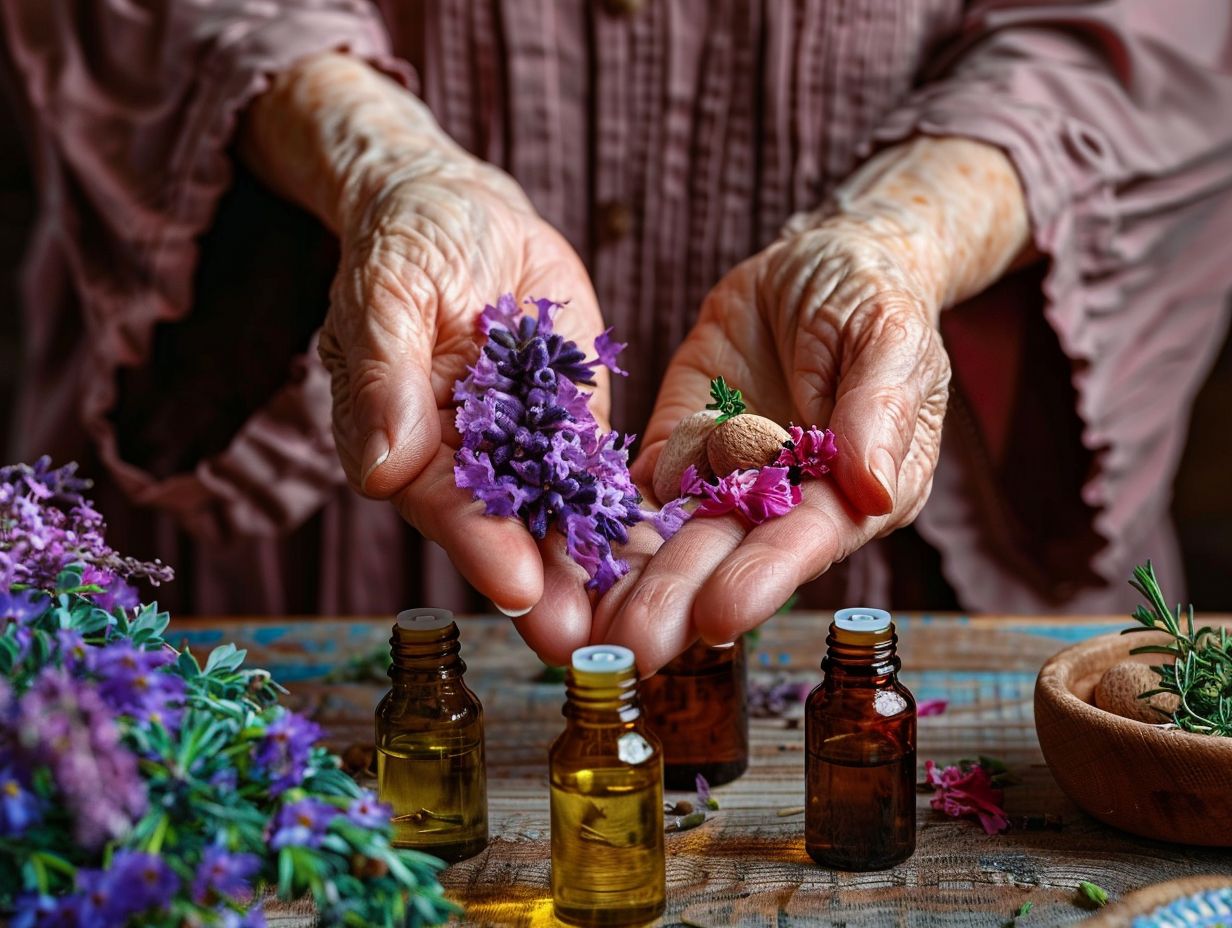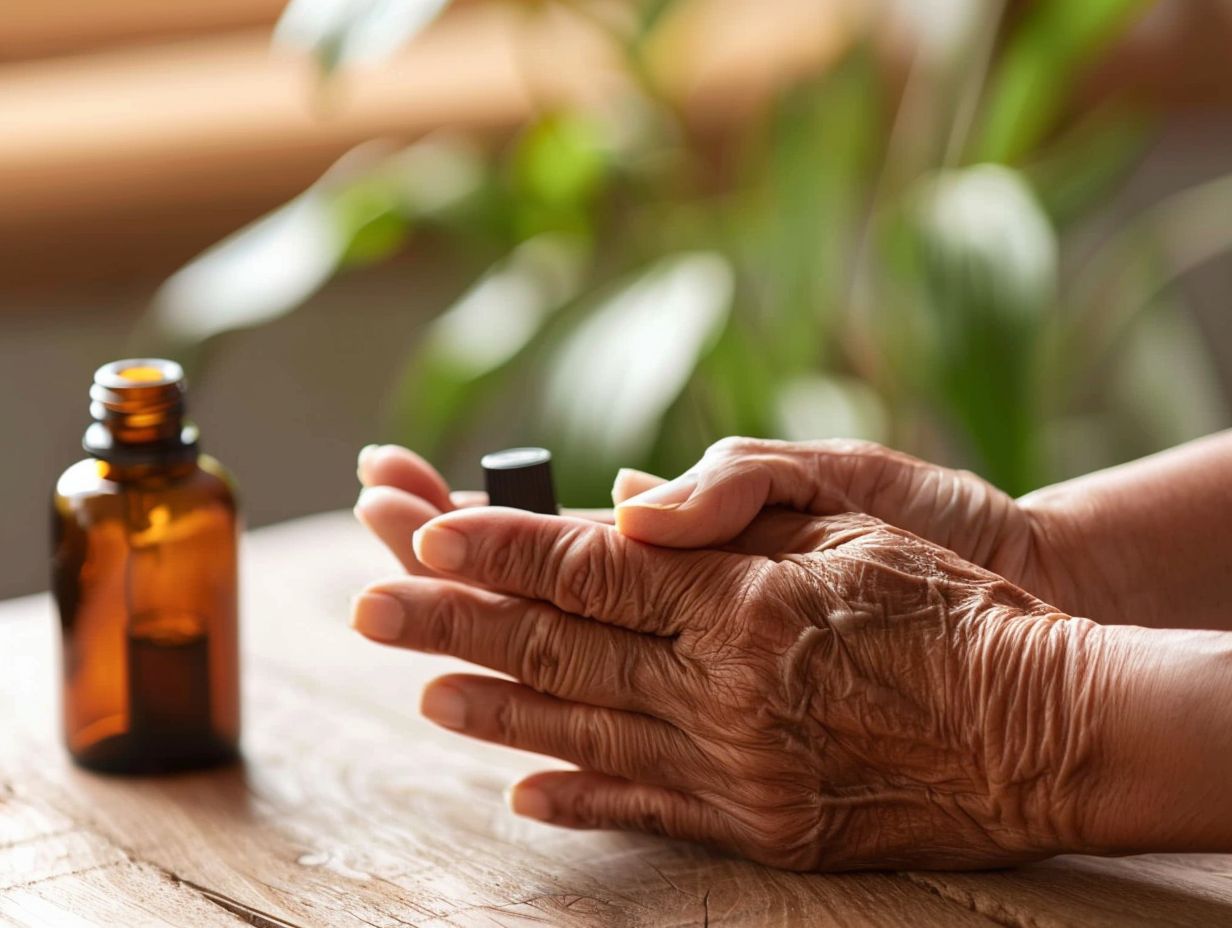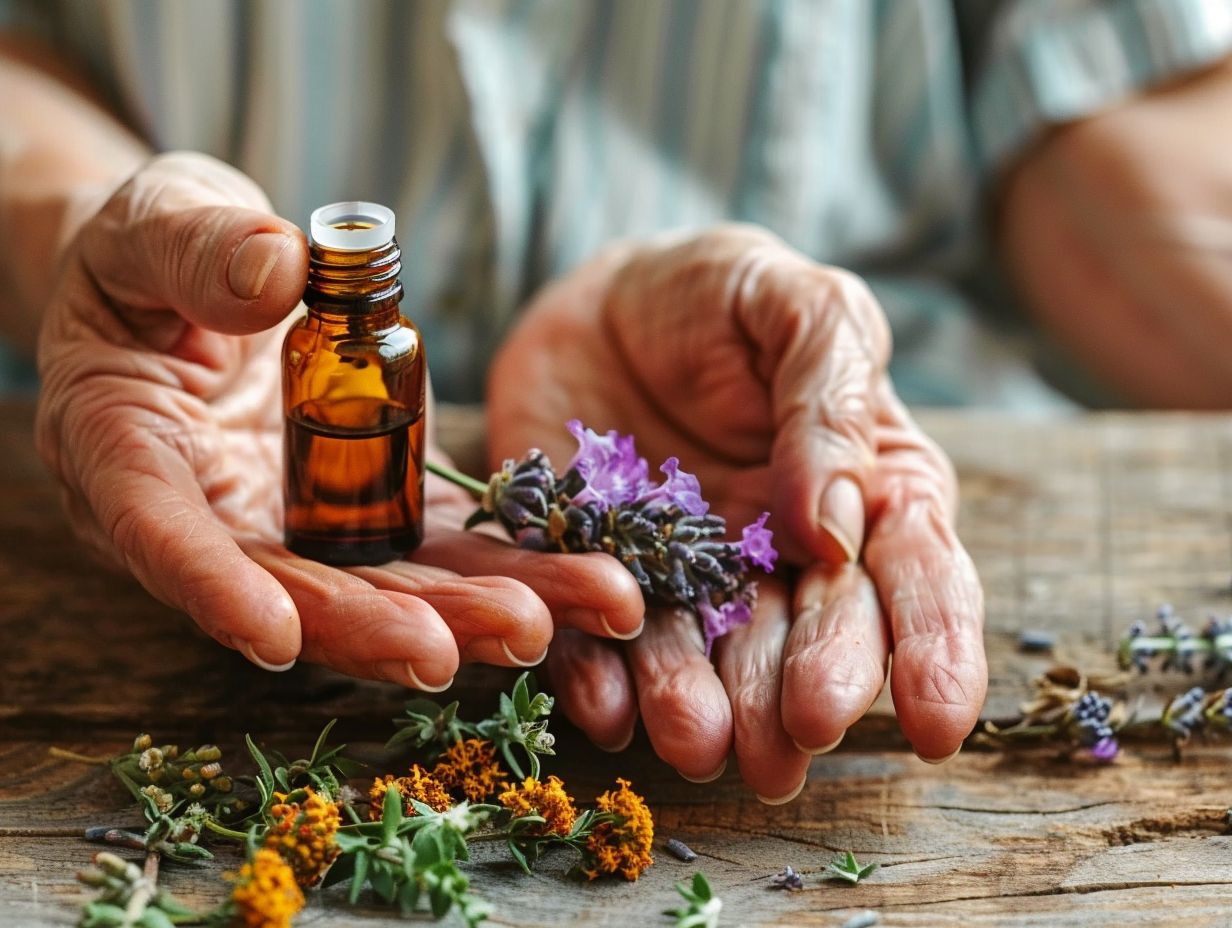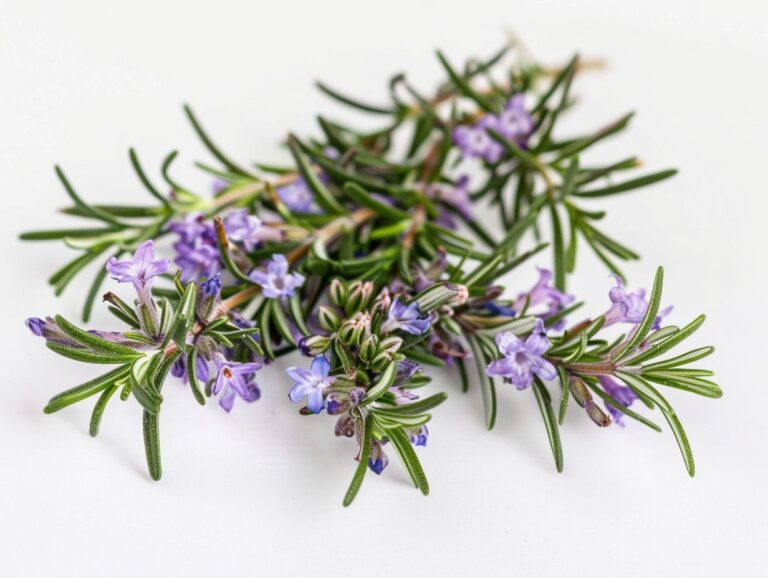How Does Aromatherapy Help Arthritis
Are you looking for natural remedies to manage arthritis pain and inflammation?
Aromatherapy may be the solution you’ve been searching for.
In this article, we will explore what aromatherapy is, how it can help with arthritis, the best essential oils to use, and different methods of application.
We will also discuss the potential risks and side effects to be aware of.
Join us as we dive into the world of aromatherapy for arthritis relief.
Key Takeaways:
What Is Aromatherapy?
Aromatherapy is a holistic healing treatment that uses natural plant extracts, known as essential oils, to promote health and well-being. These essential oils are extracted from various parts of plants and are renowned for their therapeutic properties.
Throughout history, aromatherapy has been utilized for various purposes, dating back to ancient civilizations like the Egyptians, Chinese, and Greeks. The practice of using essential oils for their healing benefits has evolved over centuries and is now commonly incorporated into modern holistic wellness practices.
The benefits of aromatherapy include stress relief, improved sleep, mood enhancement, and even pain management. Methods of application include diffusion, inhalation, topical application, and even ingestion, though this should be done with caution and under professional guidance.
What Is Arthritis?
Arthritis is a term referring to joint pain or joint disease, which causes inflammation in one or more joints, leading to discomfort, swelling, and stiffness. It affects millions of people worldwide and can significantly impact one’s quality of life.
There are several types of arthritis, including osteoarthritis, rheumatoid arthritis, and psoriatic arthritis, each with its unique characteristics and treatment approaches.
Osteoarthritis, commonly known as wear-and-tear arthritis, occurs when the protective cartilage between bones wears down, leading to pain and stiffness.
Rheumatoid arthritis is an autoimmune condition where the immune system mistakenly attacks the joints, causing inflammation. Psoriatic arthritis often affects individuals with psoriasis, leading to joint pain, swelling, and skin changes.
Common symptoms of arthritis include joint pain, swelling, stiffness, and reduced range of motion. These symptoms can vary in intensity from mild discomfort to debilitating pain, impacting everyday activities.
What Are The Different Types of Arthritis?
The two primary types of arthritis are Rheumatoid Arthritis and Osteoarthritis.
Rheumatoid Arthritis is characterized by the immune system mistakenly attacking the joints, causing inflammation, swelling, and stiffness. This chronic inflammatory disorder not only affects the joints but can also target other organs in the body.
Osteoarthritis, however, results from the gradual breakdown of cartilage in the joints, leading to pain, tenderness, and reduced flexibility. It commonly affects weight-bearing joints such as the knees, hips, and spine.
Both conditions can significantly impact joint health, limiting mobility and causing discomfort. Proper management strategies, including medication, physical therapy, and lifestyle adjustments, play a crucial role in alleviating symptoms and improving quality of life for individuals with arthritis.
How Does Aromatherapy Help Arthritis?
Aromatherapy offers relief to arthritis patients by reducing inflammation and alleviating pain associated with the condition. Through the use of essential oils, aromatherapy serves as a natural therapeutic approach that targets the symptoms of arthritis.
Essential oils such as lavender, eucalyptus, and peppermint have been found to possess anti-inflammatory properties, making them effective in easing the discomfort caused by arthritis. These oils can be applied through inhalation, massage, or added to baths to provide soothing relief. Aromatherapy not only aids in pain management but also promotes relaxation and stress reduction, enhancing the overall well-being of individuals battling arthritis. The calming scents of essential oils can contribute to a sense of comfort and aid in the body’s healing process.
Reduces Inflammation
Aromatherapy has been shown to reduce inflammation in arthritic joints, providing relief from swelling and discomfort. Research studies have highlighted the anti-inflammatory properties of specific essential oils in managing arthritis symptoms.
These essential oils, such as ginger, lavender, and eucalyptus, contain compounds that can help alleviate joint inflammation and provide pain relief. Ginger, for example, has analgesic and anti-inflammatory effects, making it beneficial for arthritis sufferers.
Lavender oil is known for its calming properties and may help reduce inflammation in joints, while eucalyptus oil has been shown to possess analgesic and anti-inflammatory properties, making it a popular choice for arthritis relief. The combination of these essential oils in aromatherapy treatments can offer a holistic approach to managing arthritis symptoms.
Relieves Pain
Aromatherapy offers pain relief for arthritis patients by targeting the symptoms of discomfort and soreness commonly associated with the condition. Essential oils like copaiba and orange are known for their analgesic properties, providing natural pain relief.
These essential oils work by interacting with the body’s olfactory system, triggering a response in the brain that can help reduce the perception of pain. The anti-inflammatory properties present in oils such as lavender and eucalyptus further aid in decreasing swelling and inflammation around the affected joints, offering additional relief. The calming effects of aromatherapy can also help promote relaxation and reduce stress, which are common triggers for arthritis flare-ups. Incorporating aromatherapy into a holistic arthritis management plan can lead to improved quality of life for patients dealing with this chronic condition.
Improves Mood and Sleep

Essential oils like lavender and ginger have been found to have a significant impact on reducing anxiety and stress levels, common issues for individuals with arthritis. The calming properties of these oils help to create a soothing environment, aiding in relaxation and fostering a sense of well-being.
The pleasant scents of these oils can also trigger positive memories and emotions, further boosting mood enhancement and reducing depressive symptoms commonly associated with chronic pain conditions.
Enhances Relaxation
Aromatherapy aids in relaxation for arthritis patients, offering a soothing and calming effect that contributes to stress reduction and improved mental well-being.
The benefits of aromatherapy extend beyond physical relief to promote relaxation and overall wellness. Specifically, essential oils like eucalyptus and copaiba have shown remarkable therapeutic benefits in alleviating arthritis symptoms. Eucalyptus oil, known for its anti-inflammatory properties, can help reduce joint pain and stiffness, while copaiba oil acts as a natural pain reliever. The inhalation or topical application of these oils can provide not only physical relief but also a sense of tranquility, helping patients cope with the challenges of arthritis.
What Are The Best Essential Oils for Arthritis?
In terms of managing arthritis pain, essential oils such as ginger oil, lavender oil, eucalyptus oil, copaiba oil, and orange oil have shown promising results in providing relief from symptoms. These oils possess unique properties that make them beneficial for arthritis patients.
Ginger oil is known for its anti-inflammatory and analgesic properties, helping reduce joint swelling and pain. Lavender oil, with its calming scent, can help relax muscles and soothe joint discomfort. Eucalyptus oil offers a cooling sensation, relieving pain and improving circulation in affected areas.
Copaiba oil is rich in beta-caryophyllene, a compound that acts as a natural anti-inflammatory agent, reducing arthritis-related inflammation. Orange oil, with its uplifting aroma, can boost mood and provide relief from arthritis pain.
Lavender Oil
Lavender oil is known for its calming and anti-inflammatory properties, making it an excellent choice for alleviating arthritis pain through aromatherapy. The soothing scent of lavender oil provides relief and promotes relaxation in arthritis patients.
Lavender oil can help improve sleep quality, reduce anxiety levels, and enhance overall emotional well-being in individuals dealing with the challenges of arthritis. By inhaling the pleasant aroma of lavender oil, arthritis patients may experience reduced stress, which is crucial for managing the symptoms of this chronic condition. Aromatherapy with lavender oil is a gentle and natural way to support both physical and mental health for those living with arthritis.
Peppermint Oil
Peppermint oil offers a cooling sensation and pain relief for arthritis patients, making it an excellent choice for topical application or aromatherapy massage. The menthol in peppermint oil provides a refreshing effect that can help alleviate joint discomfort.
The anti-inflammatory properties of peppermint oil play a crucial role in reducing inflammation around affected joints, thereby contributing to improved mobility and comfort. Its soothing aroma not only relaxes the mind but also aids in reducing stress and tension, which are often associated with arthritis flare-ups. When used topically, it can help increase blood circulation in the affected area, promoting faster healing and reducing stiffness.
Eucalyptus Oil
Eucalyptus oil is known for its anti-inflammatory and analgesic properties, making it a popular choice for arthritis pain relief through aromatherapy massage. The cooling effect of eucalyptus oil can help reduce joint inflammation and promote relaxation.
Eucalyptus oil contains compounds like eucalyptol that have been found to have pain-relieving effects when applied topically. These properties can provide relief from the stiffness and discomfort associated with arthritis, allowing individuals to experience enhanced mobility and improved quality of life.
Rosemary Oil
Rosemary oil has analgesic and circulation-boosting properties that make it beneficial for arthritis pain relief and improving skin health. When used in aromatherapy or massage, rosemary oil can alleviate joint discomfort and promote better circulation.
Studies have shown that the active compounds in rosemary oil, such as camphor and rosmarinic acid, possess anti-inflammatory qualities that can help reduce swelling and pain associated with arthritis. The invigorating scent of rosemary oil can uplift mood and provide a sense of relaxation during massage sessions.
For skin health, the antioxidants in rosemary oil help combat free radicals and promote a youthful complexion. Regular application of diluted rosemary oil can improve skin tone and texture, making it a popular ingredient in skincare products.
Ginger Oil

Ginger oil contains anti-inflammatory compounds that help reduce joint inflammation and alleviate arthritis pain. When used in aromatherapy or massage, ginger oil provides relief from symptoms and supports joint health.
One of the key compounds found in ginger oil is gingerol, which has demonstrated significant anti-inflammatory effects. By inhibiting pro-inflammatory molecules, ginger oil can help decrease swelling and pain in arthritic joints. The analgesic properties of ginger oil can provide a soothing sensation when applied topically during massage therapy.
How To Use Aromatherapy for Arthritis?
Aromatherapy can be effectively used for arthritis through methods like topical application, inhalation, and aromatherapy massage. When using essential oils, dilute them in a carrier oil for safe application and maximum benefits.
Inhalation of essential oils can provide relief by adding a few drops to a diffuser or inhaling from a tissue. This method helps in calming inflammation and reducing pain levels.
For topical application, mix a few drops of essential oils with a carrier oil such as coconut or almond oil before gently massaging onto the affected joints or muscles. This aids in improving circulation and relaxing the area.
When opting for aromatherapy massage, blend your chosen essential oils in a carrier oil to enhance the effects of the massage. This method promotes relaxation and soothes muscle stiffness associated with arthritis.
Topical Application
Topical application of essential oils in aromatherapy is a popular method for arthritis relief, as it allows the oils to be absorbed through the skin, targeting the affected joints directly. This application method is effective in providing localized relief.
Essential oils, known for their potent therapeutic properties, can offer significant relief when applied topically. The process involves diluting the essential oil of choice in a carrier oil to ensure safe application on the skin. Massaging the oil blend onto the affected joints allows for better absorption and quicker relief. The direct interaction between the essential oils and the skin enables the active compounds to penetrate deeply, addressing inflammation and pain at the source.
Inhalation
Inhalation of essential oils in aromatherapy is a therapeutic method for managing arthritis symptoms, as the aroma molecules stimulate the olfactory system and provide physiological benefits. This method offers a holistic approach to pain relief and relaxation.
Aromatherapy inhalation involves breathing in the molecules released by essential oils, which then travel through the nasal passages to the brain.
This direct pathway allows the oils to exert their calming, anti-inflammatory, and analgesic effects on the body.
The act of inhaling pleasant scents can trigger the release of neurotransmitters like serotonin and endorphins, promoting a sense of well-being and reducing stress levels.
Aromatherapy Massage
Aromatherapy massage is a soothing and effective therapy for arthritis patients, combining the benefits of touch and essential oils to reduce pain and promote relaxation. This gentle massage technique enhances circulation and eases joint discomfort.
The use of essential oils in aromatherapy massage can further aid in reducing inflammation, increasing flexibility, and soothing muscle tension commonly associated with arthritis. The calming scents of lavender, eucalyptus, or peppermint not only create a pleasant sensory experience but also have scientifically proven therapeutic benefits.
The holistic approach of aromatherapy massage focuses on not just managing the physical symptoms but also nurturing the emotional and mental well-being of individuals living with arthritis. By incorporating personalized essential oil blends based on individual needs, this therapy can provide targeted relief and support for overall health.
Are There Any Risks or Side Effects of Aromatherapy for Arthritis?
While aromatherapy is generally safe for arthritis patients, there are potential risks and side effects to be aware of, such as skin irritation, allergic reactions, and interactions with medications. It is essential to perform a patch test and consult a healthcare professional before using essential oils.
Some essential oils may cause photosensitivity, making the skin more sensitive to sunlight, which could lead to sunburn or skin damage. Allergic reactions can vary from mild rashes to severe respiratory distress in some individuals. Certain essential oils can interact with medications, affecting their effectiveness or causing harmful side effects.
Monitoring for any signs of irritation or adverse reactions after applying essential oils is crucial. If any negative symptoms arise, such as redness, itching, or swelling, it is important to discontinue use immediately and seek medical advice.
Skin Irritation
Skin irritation can occur when using essential oils in aromatherapy, especially for individuals with sensitive skin or allergies. It is essential to dilute oils properly and perform a patch test before widespread application to prevent adverse reactions.
Essential oils, though praised for their therapeutic benefits, can be potent substances that have the potential to cause skin irritation if not handled with caution. Due diligence in understanding the nature of each oil and its possible effects is paramount. Some oils are known to be more skin-friendly than others and may still cause irritation if applied in high concentrations.
Even natural ingredients can elicit reactions, making it crucial to always err on the side of safety. A simple patch test on a small area of skin can help identify any adverse responses before full application, enabling safe and enjoyable aromatherapy experiences.
Allergic Reactions

Allergic reactions to essential oils can vary from mild irritation to severe responses in sensitive individuals, including those with arthritis. Skin redness, swelling, or hives are common manifestations of allergies, while some may experience headaches or nausea. For arthritis patients, pinpointing the specific trigger oils is essential to prevent exacerbation of symptoms and ensure a safe aromatherapy experience. Identifying allergens through patch testing or consulting with a healthcare provider can help in creating a personalized oil blend that promotes wellness without harmful effects.
Interactions with Medications
Essential oils used in aromatherapy may interact with certain medications, affecting their efficacy or causing adverse effects. It is advisable for arthritis patients to consult a healthcare provider before incorporating essential oils into their treatment regimen to avoid potential interactions.
When considering the use of essential oils for arthritis management, understanding their possible impact on medication is crucial. For example, oils like lavender and peppermint could potentiate the effects of blood-thinning medications such as warfarin, leading to increased risk of bleeding.
By communicating openly with healthcare providers, patients can receive personalized guidance on the safe and effective integration of essential oils into their treatment plan. Such discussions help ensure that the benefits of aromatherapy are maximized without jeopardizing the efficacy of prescribed medications.
Frequently Asked Questions
How Does Aromatherapy Help Arthritis?
Aromatherapy is the use of essential oils to improve physical, emotional, and mental well-being. It has been shown to be beneficial for those living with arthritis by reducing pain and inflammation, improving mobility, and promoting relaxation.
What are the Benefits of Aromatherapy for Arthritis?
Aromatherapy can provide relief for arthritis symptoms such as pain, stiffness, and swelling. It can also improve flexibility and range of motion, decrease stress and anxiety, and promote better sleep.
Which Essential Oils are Best for Arthritis?
Some essential oils that have been found to be particularly effective for arthritis include lavender, peppermint, eucalyptus, frankincense, and ginger. These oils have anti-inflammatory and pain-relieving properties.
How Do You Use Aromatherapy for Arthritis?
Aromatherapy for arthritis can be used in a variety of ways, such as through inhalation, topical application, and massage. Diffusing essential oils, adding them to a warm bath, or using them in a compress are all effective methods of application.
Are There Any Risks or Side Effects of Aromatherapy for Arthritis?
While aromatherapy is generally considered safe, it is important to use caution when using essential oils, as they are highly concentrated and can cause skin irritation if not properly diluted. It is also important to consult with a healthcare professional before using aromatherapy, especially if you are pregnant, have allergies, or are taking medications.
Can Aromatherapy Be Used Alongside Traditional Treatments for Arthritis?
Yes, aromatherapy can be used as a complementary therapy alongside traditional treatments for arthritis. It is important to consult with your doctor before using any new treatment, and to inform them of any essential oils you plan to use. Aromatherapy can enhance the effects of traditional treatments and provide additional relief for arthritis symptoms.







